
Reading beyond Anne Frank
Alexandra Zapruder read the poignant diaries of young men and women who experienced the Holocaust before a quiet audience Sunday afternoon, as part of the Ninth Annual Judaica Lecture Series in Bridwell Library.
The diary entries are from her book “Salvaged Pages: Young Writers’ Diaries of the Holocaust,” a compilation of stories collected over 11 years.
“This material deepens and complicates what we know or what we think we know about the Holocaust,” she said. “A sense of complexity is revealed in these diaries.”
Zapruder’s search for lost diaries began in 1991, after graduating from Smith College. She was hired at the Holocaust Museum in Washington, D.C., to do research on historical stories.
“I wanted to know why I, as an educated person, had never heard of any other diaries besides Anne Frank. I did not think I would find many other published works,” Zapruder said.
What she found was over 60 diaries from young people, ages 12 to 22.
The first diary Zapruder encountered at the Holocaust Museum was written by a 14-year-old boy, Yitskhok Rudashevski. Time is an important theme in the young boy’s diary.
On Rudashevski’s fifteenth birthday, he does not celebrate or receive presents. Instead, he mentions the date in passing, describing how time runs by unnoticed.
“Part of these young writers’ suffering is the theft of time – their lives are stolen away and they want their lives back,” Zapruder said.
“The writers can remember time before the war. Then, they all had a dramatic historical break with their previous life,” she said. “Every moment in time for them after was waiting for the end, when they would be liberated.”
Each diary entry read by Zapruder showed the different struggles these young people endured. Starvation, humiliation, hope, despair and moral and ethical dilemmas were everyday thoughts.
Another diary revealed how unreliable and distorted news was during the war. A young man wrote that he had heard that over 100,000 Jews had been killed in concentration camps. In reality, by the time he received that information over 3 million Jews had been murdered.
A young girl named Alice captures the moment in time when the liberation of the concentration camps was near in her diary.
“Today most people believe that the liberation was a time of joy and freedom. Alice’s entry complicates what we think we know,” Zapruder said. “She shows us how the liberation was full of chaos and despair. All the returning Jews saw was desolation in Europe.”
Even after the liberation came, the world had been marked forever. Zapruder’s collection of diaries shows how civilization was scarred and life was forever changed by the Holocaust.
“All these young writers had the drive to communicate,” she said. “They fought through the struggle to write their thoughts down in order to communicate to others the depth of their feelings.”
The diaries, which are now located in archives, were found after the war in ditches, abandoned apartments, scraps of paper and the margins of old books. Family members reclaimed the diaries upon returning to the young people’s hiding places.








